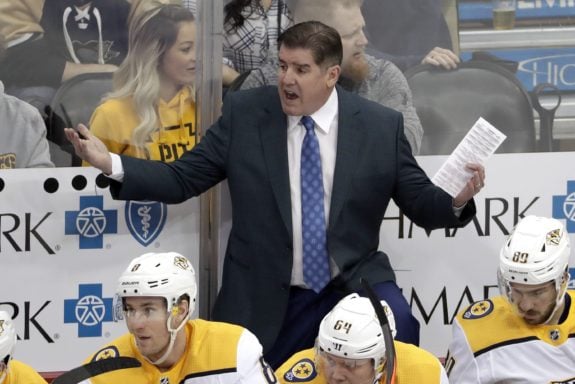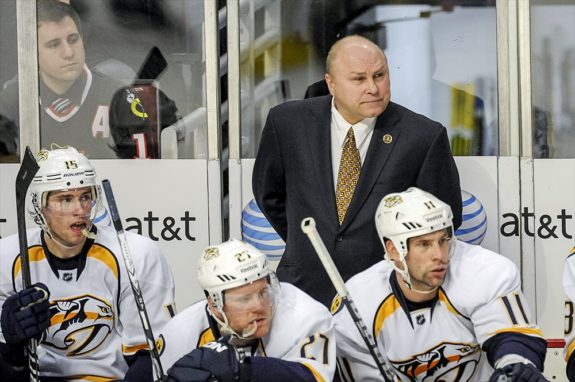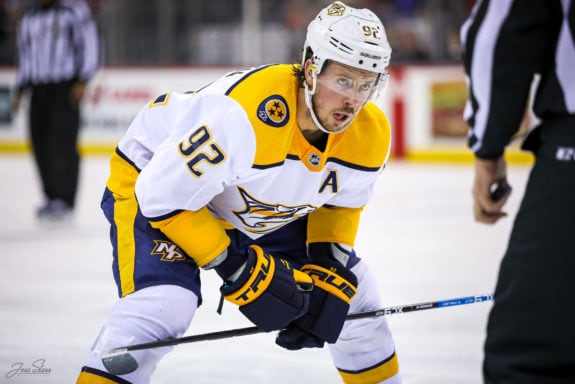Coaches are hired to be fired, or so they say. It sounds like a bizarre statement, but it’s seemingly true. Bench bosses are often relieved of their duties, either because they fail to compile anything close to a winning record, they coast along with average success, which eventually becomes unacceptable, or a coach will have so much success it will be impossible to maintain and inevitably there comes a decline, dipping a team’s performance below the “standard” that was previously created.
The Nashville Predators spent their first 15 seasons with the same head coach, Barry Trotz. As an expansion team, there were some tough years at the beginning, but that was expected. Firing the coach was never a reasonable solution. As the years went by, the Predators and Trotz fell into that second category of skating along with mediocre success. But it seemed because of the history between the two, he was afforded the benefit of the doubt, maybe more so than what other coaches would have been given.
After the 2013-14 season, Trotz’s contract had expired and the front office staff decided it was in the best interest of both parties to move on in order for the team to take the next step.
Then came Peter Laviolette. He achieved moderate success, with the peak coming when he guided the team to the Stanley Cup Final in 2017, but he ultimately failed to deliver the Predators to the promised land. After an underwhelming first half of the 2019-20 season, Laviolette was let go.

Enter John Hynes, just the team’s third head coach, which is pretty remarkable considering the franchise’s first game was in 1998.
So, the Predators clearly don’t take firing coaches lightly, which is probably a good trait to have. But they have a difficult decision to make regarding Hynes.
The organization moved on from Laviolette because, as mentioned, he couldn’t turn the team from contender into Stanley Cup champions. They reached new heights under him, but after being crowned Western Conference champions in 2017, they did nothing but regress. The playoff exits got earlier, and after winning the Presidents’ Trophy in 2017-18, the regular season results became worse and worse.
The Predators were never a basement dwelling team under Laviolette, but obviously there needs to be progression. Management and fanbases never stay satisfied with just satisfactory results. Moving on from the former Stanley Cup-winning coach was the only way to go. However, you never want to jump out of the frying pan and into the fire, and so far under the direction of Hynes, that’s exactly what it seems the Predators have done.
Concerning First Impressions
Since being hired back in early 2020, Hynes has led the Predators to a 22-20-1 record. He was hired midseason after Nashville started the 2019-20 season 19-15-7. They were above .500, but that was not the results anyone expected or demanded. Average isn’t not good enough, but that’s exactly what Hynes has delivered thus far. In fact, when you focus on this season solely, average would be a compliment. The Predators are arguably a team with a handful of potential All-Star players, but they sit in division’s seventh spot with a 6-9-0 record — and by the way there’s only eight teams in the division.
The quality of play we are seeing from the Predators — a team whose roster consists of players such as Filip Forsberg, Matt Duchene, Ryan Johansen, Viktor Arvidsson, and Roman Josi to name a few — is shocking, but Hynes leading a team to subpar results is far more predictable.
Related: NHL Rumors: Canucks, Predators, Senators, Oilers, Rangers, More
Hynes came to the Predators with just one NHL head coaching job on his resume. The Rhode Island-native was fired from the New Jersey Devils after five seasons. He left the Garden State with a 150-159-45 record to his name. He had won just one playoff game in five years.
The Predators were supposedly looking for a coach who was going to get them over the hump. Yet, they hired someone who had seen all of five NHL playoff games, in which he obviously lost four.
One complaint that many had about the Predators while Trotz was in charge was the lack of offense. He was a very defensive-minded coach, and he still is. The Predators’ identity was playing low-scoring games. Their blue line was their cornerstone and you can still see those roots in today’s team. Laviolette is a more offensive, up-tempo, in-your-face type of coach and he was the guy to shake the team up, helping them break from the style that had become, dare we say it… boring.

Laviolette was able to improve the team in many areas in just his first season in the Music City. The goals for per game went up, goals against came down, and the penalty kill increased ever so slightly. There were visible gains — you could see by watching the team play that Nashville was better off with the coaching switch and the stats supported the eye test.
Related: Revisiting the Predators’ Trotz Era
However, with Hynes there’s been no real improvement. In the 41 games to start the 2019-20 season, before Laviolette was fired, the Predators averaged 3.27 goals against, they converted 16.8% of their power-play opportunities and they killed off 74.1% of the penalties they committed. In the 43 games that Hynes has been in charge, the Predators have averaged 3.07 goals against, converted 16.7% of their power plays and killed 74.5% of their penalties.
So, as you can see, there is very little difference in the major stat categories. The biggest difference in Hynes’ favor was the improvement of the goals against average, dropping from 3.27 to 3.07. It’s not a big difference, but it’s a difference. However, what you’ve probably noticed is the fact that their goals for per game wasn’t mentioned. Well, that’s the significant discrepancy, one that has not been kind to the current coach, and it makes the ground he made up in the goals against department less impactful.
Again, using the same time span, the Predators were averaging 3.44 goals per game, the sixth best mark in the league at the time of Laviolette’s firing. Since then — under Hynes — they are scoring at a rate of 2.47 per game, ranking them 27th leaguewide.
Star Power Fading?
But it’s not just team stats suffering under Hynes’ leadership.
Your best players need to be your best players if you want significant and sustained success. Using the start of the 2016-17 season, arguably the beginning of the Predators’ ascension, and capping the sample size just before Hynes was hired; Johansen, Forsberg, Arvidsson, Duchene, and Josi led the team in points per game. Those top-five leading players all had an average of 0.73 or higher. Since Hynes took over, they’ve all seen their points per game drop, with some more concerningly than others.
From the 2016-17 season to Laviolette’s firing, Johansen had a points-per-game average of 0.73. Since the coaching change, the centerman has seen a catastrophic collapse, now averaging just 0.38. Arvidsson, arguably one of the team’s best scorers, has experienced a decline from 0.77 to 0.40. Finally, the player who had incredible hype before arriving in Nashville, Duchene only played 38 games for the Predators when Laviolette was in charge, but during that time he registered 0.74 points per game. Since the switch, he owns a 0.51 average.

Yes, of course the individual players own some responsibility with their lower production. However, when there’s a decline among the top-five players, especially considering they were all capable of recording respectable stats pre-Hynes, the coach must own the majority of the blame.
Head coaches in Nashville usually have fairly long leashes. When there’s a shakeup at the leadership level, sometimes things get worse before they get better. However, midseason changes — as Hynes was — are usually to stop a slide or to see instant improvement. If the Predators were regressing under Laviolette, then they’re free falling under Hynes.